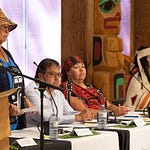Five years after protests and powerful promises of justice and “real change,” a closer look at water rights, tax policy, and tribal influence raises serious questions. While local residents are metered and taxed, a sovereign corporation flourishes—untouched by the rules that bind everyone else. Is this the equity we were promised, or a new kind of double standard?
A lot has changed in the last five years—and a lot hasn’t.
As we enter another summer of unrest, it’s hard not to recall the nationwide protests of 2020. On June 17th, 2020, amid the Black Lives Matter demonstrations, the Jamestown S’Klallam Tribal Council published a public statement in the Peninsula Daily News. It read, in part:
“The Jamestown S’Klallam Tribe stands in solidarity with the Black Lives Matter movement, against systemic racism on Black people, Native people, and people of color. We vow to work for a world in which all people… share this precious planet free from inequality and injustice… We join our brothers and sisters of color in the current worldwide movement against racism, oppression, and police brutality. We are opposed to violence of any kind… We call for real change that addresses injustices and disparities, instills fairness in the criminal justice system and offers reparations to heal historic trauma and poverty.”
The sentiment was noble. The aspirations, universal. But five years on, what did all this talk of “real change” and “equity” truly deliver?
Here in Clallam County, last month, a white elderly man was fatally assaulted in broad daylight during the Irrigation Festival. His alleged attacker—a known drug user, suspected child sex trafficker, and person of color—is free. It was barely reported on by legacy media outlets. Inequity in media and the justice system? That door swings both ways.
In terms of economic fairness, what does equity look like when tax-exempt corporations—backed by sovereign status—can operate casinos, gas stations, golf courses, and shellfish farms while neighboring businesses scrape by under rising taxes and regulation? In a county with a median household income of $65,000, the Jamestown Tribe’s corporate empire reported $86 million in annual revenue last year. Where does equity come in when one of the most profitable entities in the region also receives millions in federal, state, and local grants?
And when it comes to gender, why is it that Washington State offers paid family leave to working mothers, yet women employed by the Tribe—because of its sovereign legal status—report going without?
Even the land and water we share raise questions. Wetlands that would be off-limits to most are graded and developed under tribal permitting authority. A non-native shellfish species is being farmed in a national wildlife refuge, raising eyebrows among conservationists—but few are willing to speak openly due to the fear of being labeled.
Meanwhile, local residents in the Dungeness Basin are required to meter their private wells, limit outdoor watering, and comply with strict Department of Ecology regulations—while tribal enterprises face no such mandates. Somehow, the Tribe’s golf course stays lush and green through the driest stretches of the year. In a region where water scarcity is becoming a community-wide concern, does “equity” mean some monitor every drop while others pour it on the fairway?
Then there’s governance. While most community leaders answer to the public, elected county officials have repeatedly taken meetings on tribal land, outside the jurisdiction of open government laws. On issues as vital as water rights, public safety, and land use, conversations with lasting impacts on residents occur behind closed doors.
These aren’t abstract ideas. They’re happening now. Is this the “equity” we were promised?
Five years ago, the call was for real change—change that would heal divisions, level the field, and offer opportunity for all. Today, it’s fair to ask whether that call has instead resulted in a two-tiered system, where power—not principle—determines who must follow the rules, and who gets to rewrite them.
True equity demands more than words. It demands fairness across the board—regardless of wealth, race, sovereignty, or influence. If that ideal still matters, it’s time we start holding it up to the light. Not just in statements—but in action.
Last Equitable Wednesday, readers were asked if they or their organization had ever faced challenges navigating county permits for a cultural or community event. Of 77 res ponses:
22% said, “Yes”
17% said, “No”
5% said, “We considered it, but gave up”
56% said, “Not applicable”
The following is an article published in the February 2021 Jamestown S’Klallam Tribal Newsletter.
An Indigenous Celebration of Black History Month
By Thaddeus O’Connell
Black liberation is irreversibly tied to indigenous sovereignty. Enslaved black people were forced to till the land that was stolen from us. Exclusionary laws based around anti-blackness were used to create the white race as a form of social control. This set the precedent of the United State's exclusionary legal system that disenfranchised our ancestors from the land and drove our Klallam language to nativized linguistic extinction. A full restoration of our people’s sovereignty will not occur without the liberation of black people from the system that took it away.
What I am about to say goes against many ramblings of political pundits, both liberal and conservative. The United States is no longer a “Republic with a well developed bourgeois tradition.” It's a young, unstable, fledgling Democracy with universal suffrage codified by law. Even though we gained citizenship in 1924, Native Americans had to fight for the right to vote in each individual state on a case by case basis. Further still, the same tactics used against black voters were used to quash the native vote, including but not limited to poll taxes, literacy tests, and straight up intimidation. It was not until the organization of a racially diverse coalition, centered around liberating black voters from their oppression, that Native Americans were truly granted the right to vote. When Congress passed the Voting Rights Act of 1965, the activists of the civil rights movement cemented themselves as the true founding fathers of our Democracy.
Resisting black liberation on account of one’s own oppression is like a crab pulling down it’s brethren as they are about to escape a fisherman’s bucket. When enslaved black people kept on escaping colonial England to the swamps of Spanish Florida, did the Native Americans living there return them to their captors? No. They allied with them, learning African foodways such as rice farming and barbecue, and teaching them in return the warrior traditions of their people. The emergent Seminole culture was an amalgamation of black, Carribean, indigenous, and Spanish traditions that allowed armed communities to form all over Florida that would serve as safe havens for black and indigenous people alike. It took the USA two wars, fought as a traditional military campaign against an equally matched enemy, to break up this alliance and force the Seminole on the trail of tears.
Exciting changes are coming to Indian Country. Deb Haaland is not only set to become the first Native American Interior Secretary, she will be the first native appointed to any cabinet level position. The possibility of the Bureau of Indian affairs becoming a cabinet level department seems increasingly likely to be debated by the 117th United States Congress, with our own Tribe’s chairmen Ron Allen on the list of names being floated for secretary. It is important to recognize that these changes are delivered on the shoulders of the “Black Lives Matter” movements sparked by heinous police killings of multiple unarmed black people. Key swing states such as Pennsylvania, Wisconsin, Arizona, Michigan, and most notably Georgia, (where a pastor has been elected the first black senator in state history) saw significant protest movements in major metropolitan centers. It is these movements that mobilized an unprecedented amount of black voters, black women voters, to the polls, delivering us a Biden presidency and flipping the senate. Indigenous solidarity with black liberation will ensure we ALL survive past the next seven generations.
About the author: Thaddeus is a Jamestown Tribal citizen from the Cook/Kardonsky family, younger brother of Timothy O’Connell and son of Toni O’Connell. He is a student with a full course load intent on earning a bachelor’s in American Indian Studies and a juris doctorate of law. He lives in Portland, Oregon where he has proudly partaken in black lives matter protests. He has been tear gassed with a modified flamethrower by Trump’s secret police, illegally detained by city police, attacked by white supremacists, and doxxed by racist internet trolls. Likewise, he has picked up protest trash, swept glass off the street, helped businesses board up windows and clean graffiti, and met more indigenous people in 9 months of protesting than he has in 4 years of living in Portland.














